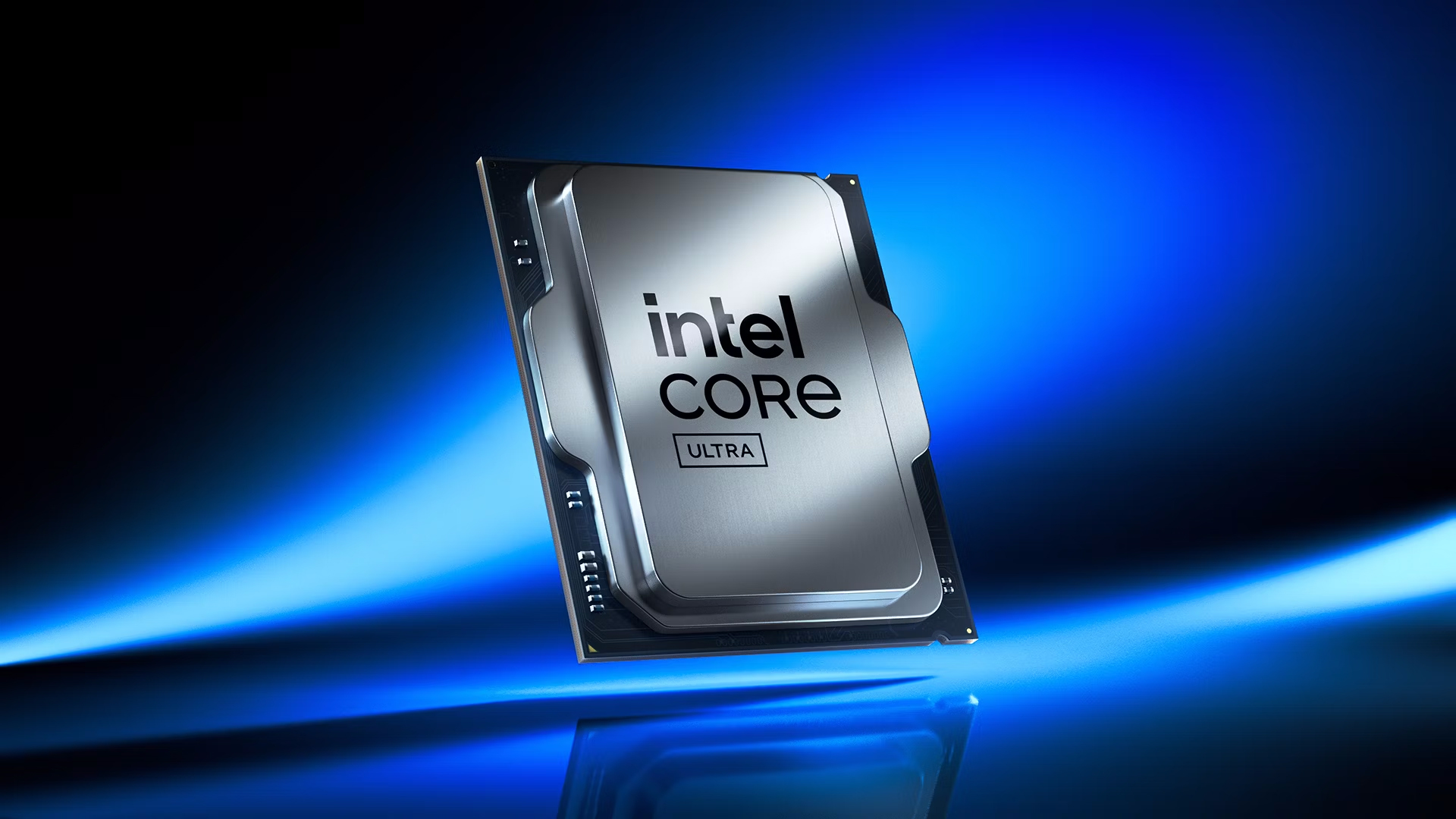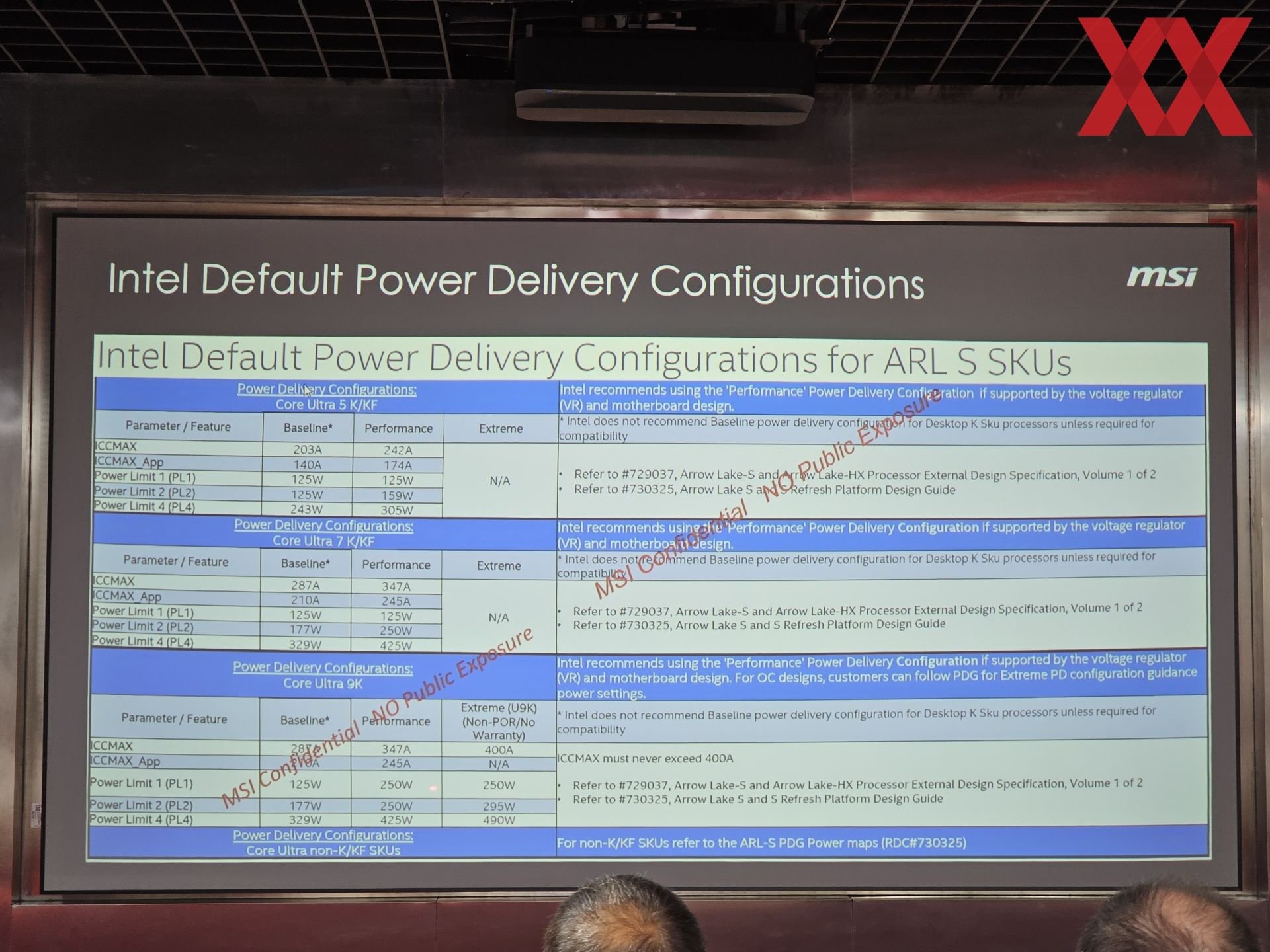Leaked MSI slide mentions Arrow Lake Refresh — reignites hopes that LGA 1851 will last more than a single-generation
Can Arrow Lake hold off AMD for 2 years?

A leaked slide from MSI, explaining the Power Configurations for Intel's Arrow Lake series of CPUs, has been shared by a user on the popular Korean hardware forum Quasar Zone. Interestingly, the same slide mentions a possible "Arrow Lake-S Refresh" which was just rumored to be canceled some time ago.
Funnily enough, the slide has large watermarks clearly stating "MSI Confidential" and "NO Public Exposure," yet it is circulating freely on the Internet. To the left, we can see Power Delivery Configurations for Intel's upcoming Core Ultra 5K, 7K, and 9K families of processors.
The right side contains a few important notes, details and an RDC (Resource and Documentation Center) document codenamed "#730325" which details the platform design guide for a potential Arrow Lake S Refresh. The headline here is that Intel seems to have been in talks with board partners regarding a refresh for Arrow Lake. In fact, it appears the product was in development since OEMs were already designing the Power Delivery Profiles for these CPUs and upcoming Non-K SKUs.

However, to reiterate, many leakers still assert that Intel has pulled the plug on Arrow Lake Refresh. Most notably, Panzerlied, a Chiphell forum member renowned for leaking the initial specifications of the RTX 50 lineup, claims that Arrow Lake will be the only desktop offering from Intel until 2026. It is entirely possible that Intel could port Panther Lake next year to desktops under its Core Ultra 300 series: but that's mostly speculation on our part.
Intel has been following a one-year cadence in its desktop CPU department since the 12th Generation. Alder Lake launched in 2021, followed by Raptor Lake in 2022 and Raptor Lake Refresh in 2023. On the 24th of this month, Arrow Lake chips will hit shelves, but that begs the question, "Is this level of performance enough to hold back AMD for two years?". Even Intel says that the Zen 4-based Ryzen 7 7800X3D is 5-7% faster than its flagship Core Ultra 9 285K. Put two and two together and the Ryzen 7 9800X3D might deliver a bloodbath for Intel in gaming.
AMD releases a new generation every two years with Zen 6 projected to launch in 2026. Therefore, not all will be doom and gloom for Team Blue, but that's entirely dependent on how performant and efficient Arrow Lake is.
Get Tom's Hardware's best news and in-depth reviews, straight to your inbox.

Hassam Nasir is a die-hard hardware enthusiast with years of experience as a tech editor and writer, focusing on detailed CPU comparisons and general hardware news. When he’s not working, you’ll find him bending tubes for his ever-evolving custom water-loop gaming rig or benchmarking the latest CPUs and GPUs just for fun.
-
usertests I think there was a newer MLID leak on this, but in general it should be easy for Intel to do some kind of refresh even if they cancelled an 8+32 monster.Reply
With "tiles", they can even update the IP blocks separately from each other, give it a better iGPU, NPU, whatever. Something better than increasing clocks by 100-200 MHz. -
EzzyB I think Intel is banking on it's 1.8A process being available and that's the rumor we got (it IS all just rumors at this point.)Reply
With no date on that slide it's kind of nothing but a curiosity. We don't know if it was created before or after a rumor that Intel had cancelled the refresh. So, 🤷♂️ -
Eximo If nothing else, it would be a good test bed even if it is a limited release. I could see them repeating the Broadwell scenario.Reply -
logainofhades Intel needs to stop with the constant socket changes. One of the reasons AMD is so popular, even when performance is roughly even between the two, is upgrade path.Reply -
EzzyB Reply
You know this came up in another forum. So I looked back on my unusually long history with personal computers (nearly all of it's history actually.)logainofhades said:Intel needs to stop with the constant socket changes. One of the reasons AMD is so popular, even when performance is roughly even between the two, is upgrade path.
I could only come up with replacing the 8088 on an IBM PC with an NEC version (circa 1986) as the only time I ever had a computer and replaced the processor with another in the same socket.
It's nearly impossible to do because pretty much everything advances, not just the CPU. On the other hand I've generally bought CPU's that were the top-of-the line at the time. So I can see someone who bought something like an Intel I-3 replacing it with an I-7 or I-9 a couple of years later.
It's just never been an issue for me, you build a new PC you get a new MB, drives, graphics, etc. because they all have advanced since the last one. I AM looking over that the old Lian Li 1000B battlewagon that's on it's 4th PC though. 😁 -
logainofhades ReplyEzzyB said:You know this came up in another forum. So I looked back on my unusually long history with personal computers (nearly all of it's history actually.)
I could only come up with replacing the 8088 on an IBM PC with an NEC version (circa 1986) as the only time I ever had a computer and replaced the processor with another in the same socket.
It's nearly impossible to do because pretty much everything advances, not just the CPU. On the other hand I've generally bought CPU's that were the top-of-the line at the time. So I can see someone who bought something like an Intel I-3 replacing it with an I-7 or I-9 a couple of years later.
It's just never been an issue for me, you build a new PC you get a new MB, drives, graphics, etc. because they all have advanced since the last one. I AM looking over that the old Lian Li 1000B battlewagon that's on it's 4th PC though. 😁
AM4 broke the mold on replacing everything. 1st-3rd gen Ryzen owners are still dropping in 5700x3d's into existing systems to get more life out of them, and getting basically the same gaming performance as a non x3d Zen4 chip. I went from a 3700x to a 5800x in my AMD rig myself, because what I play is so CPU dependent. -
EzzyB Reply
From what I've seen in the last 5 years or so, the only thing significantly CPU affected is 1080 gaming. And that strikes me as kind of ridiculous. Getting 168 FPS instead of 162 FPS is.... uh, what? I mean it's measurable, but is it even noticeable to the average human being?logainofhades said:AM4 broke the mold on replacing everything. 1st-3rd gen Ryzen owners are still dropping in 5700x3d's into existing systems to get more life out of them, and getting basically the same gaming performance as a non x3d Zen4 chip. I went from a 3700x to a 5800x in my AMD rig myself, because what I play is so CPU dependent.
I think, as a general rule, certainly there can be exceptions, CPU performance on gaming is somewhat over-valued these days. It almost isn't measurable at resolutions higher than 1080. Or maybe I'm just stuck in the old days when 40FPS was what we all strived for.
None of this is rhetorical BTW. My 9700K/1660 Super and 75hz monitor isn't exactly state-of-the art, but I built what I could during the COVID lock-in. (Definitely a new build coming in the new year.) -
logainofhades ReplyEzzyB said:From what I've seen in the last 5 years or so, the only thing significantly CPU affected is 1080 gaming. And that strikes me as kind of ridiculous. Getting 168 FPS instead of 162 FPS is.... uh, what? I mean it's measurable, but is it even noticeable to the average human being?
I think, as a general rule, certainly there can be exceptions, CPU performance on gaming is somewhat over-valued these days. It almost isn't measurable at resolutions higher than 1080. Or maybe I'm just stuck in the old days when 40FPS was what we all strived for.
None of this is rhetorical BTW. My 9700K/1660 Super and 75hz monitor isn't exactly state-of-the art, but I built what I could during the COVID lock-in. (Definitely a new build coming in the new year.)
That is no longer the case.
98RR0FVQeqsView: https://www.youtube.com/watch?v=98RR0FVQeqs -
EzzyB Reply
Thanks, I'll check it out!logainofhades said:That is no longer the case.
98RR0FVQeqsView: https://www.youtube.com/watch?v=98RR0FVQeqs -
thestryker Reply
AM4 was an anomaly due to how far behind AMD. was starting from. I think that's part of the reason people have been disappointed by the jump from Zen 4 to Zen 5 when the gains are mostly a typical generational gain.logainofhades said:AM4 broke the mold on replacing everything. 1st-3rd gen Ryzen owners are still dropping in 5700x3d's into existing systems to get more life out of them, and getting basically the same gaming performance as a non x3d Zen4 chip. I went from a 3700x to a 5800x in my AMD rig myself, because what I play is so CPU dependent.
Written version if you prefer: https://www.techspot.com/article/2837-cpu-performance-4k-gaming/EzzyB said:Thanks, I'll check it out!